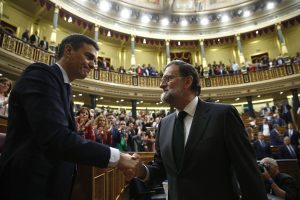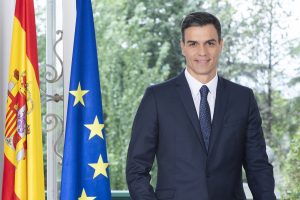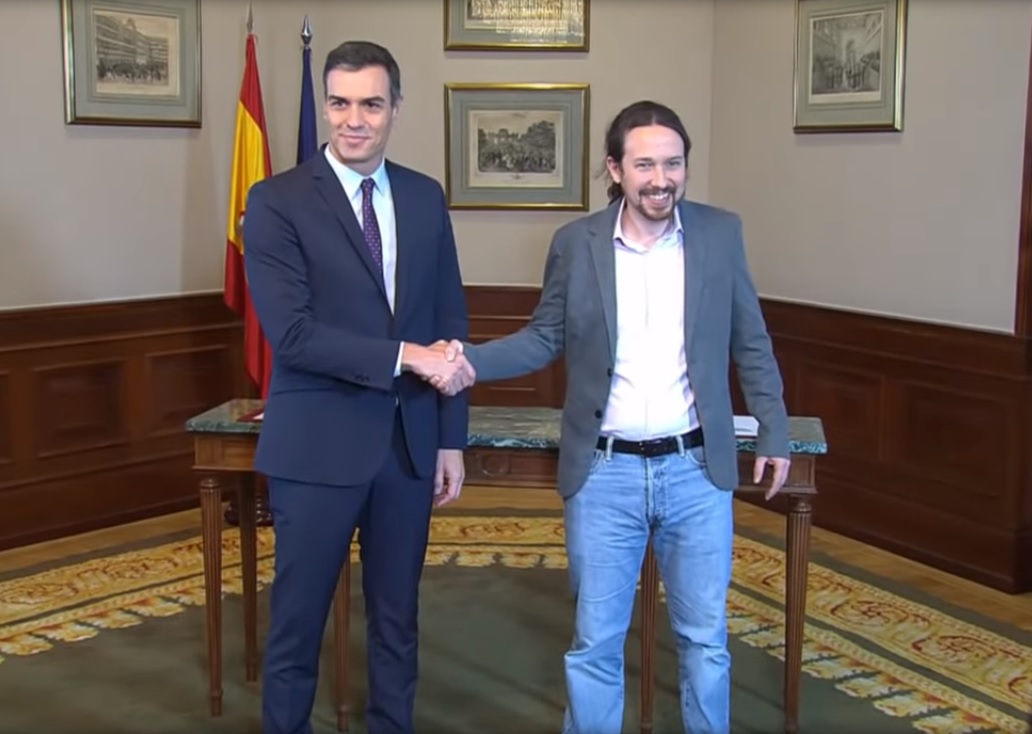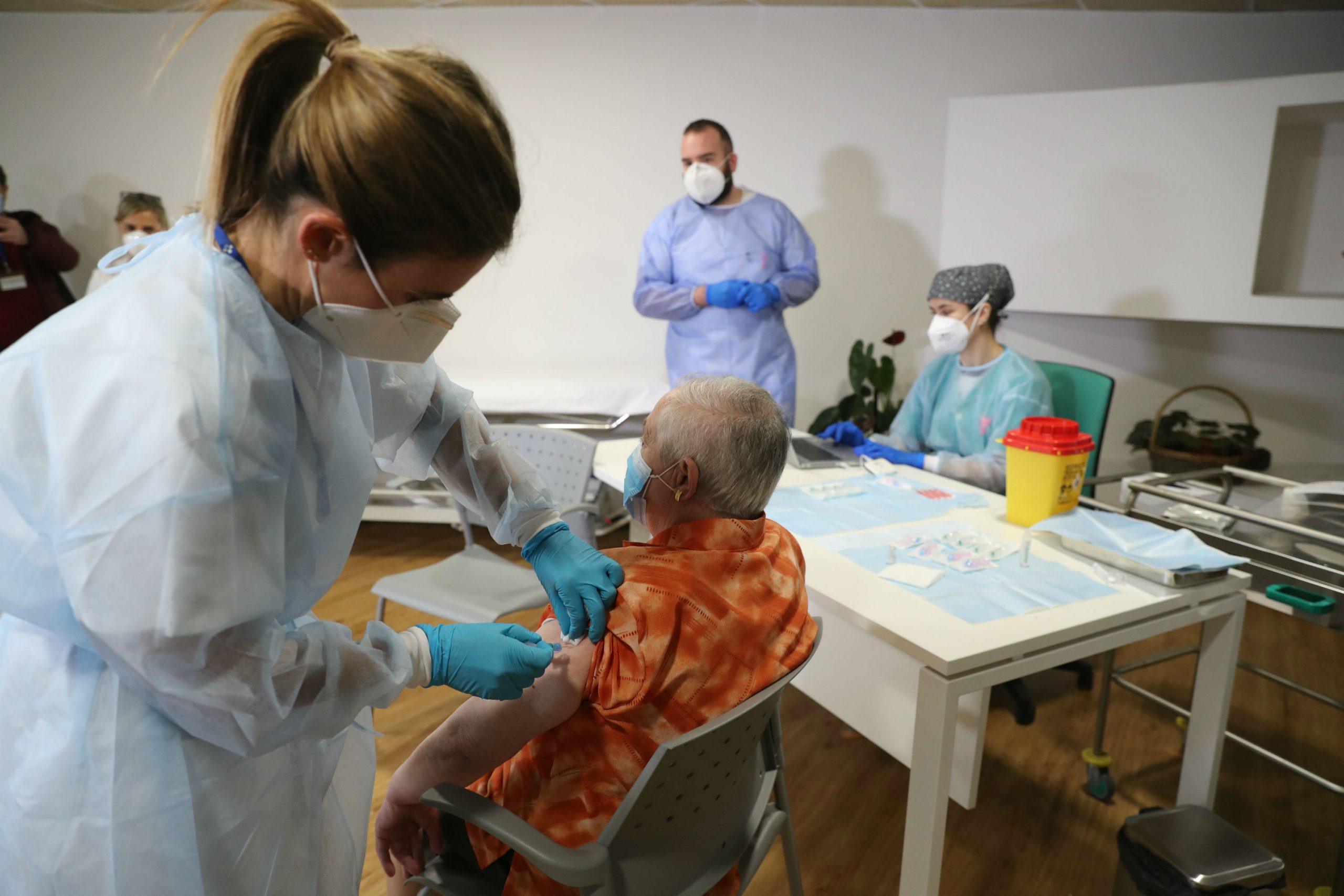10
10.1 NO CONFIDENCE VOTE AND ELECTIONS


Pedro Sánchez, leader of the Socialist Party (PSOE), became PM in June 2018 after Mariano Rajoy was unseated by a vote of no confidence in the wake of the sentences delivered by the High Court on the Gürtel Affair, the corruption case which involved the PP.
One of his first actions in government was to initiate procedures to exhume the remains of dictator Francisco Franco from the Civil War memorial monument he had ordered to be built, the Valley of the Fallen. What looked at the time as a straightforward matter took more than a year to come to fruition, after much legal wrangling between the government and Franco’s descendants and supporters.
CULTURAL RESOURCES
Franco’s exhumation (24/10/2019) The removal of the coffin containing Franco’s remains to a nearby cemetery was broadcast live on TV with no commentary. The full coverage ran for over 3 hours.
In February 2019, Sánchez was unable to get enough support in Parliament to approve his domestic budget and was forced to hold a general election in April. The Socialists won the election but did not have enough parliamentary representation to form a government on their own. After fruitless attempts to reach an agreement to form a progressive coalition government with Unidas Podemos (a new coalition between Podemos and an older left-wing party called Izquierda Unida), Sánchez called a new general election for November. The Socialists obtained similar results to April, which created the same situation that had led to the re-run of the election. However, this election revealed a new contender not to be underestimated, the far-right party Vox. Whilst the conservative party Ciudadanos collapsed, Vox obtained 15% of the votes and became the 3rd most voted party.

Vox, founded in 2013, is a strongly Spanish nationalist party which defends the recentralisation of Spain. The party advocates for the expulsion of illegal immigrants and Muslims, whom they see as a threat to Spanish identity and values. They would like to repeal the Gender Violence Law, which they consider as discriminatory against men. Basically, they are against what they call ‘gender ideology’, that is, their view that a radicalised feminist and LGTB+ agenda is being imposed on society through education and media. Following the rising trend of far-right parties in different European countries, Vox surprised everybody by obtaining 11% of the votes in the regional election in Andalusia in 2018 and 10% in the general election in April 2019. But their astounding results in the re-run of the general election in November, 15% of the vote, sounded the alarms. Two days after the election, Pedro Sánchez (PSOE) and Pablo Iglesias (Unidas Podemos) sealed their agreement to form a progressive government.

CULTURAL RESOURCES
The return of the hard-right in Spain Article by Begoña Sangrador-Vegas published in RTÉ Brainstorm, 10 December 2018
Why is Spain so unstable? CNBC Explains, 16 May 2019
10.2 COALITION GOVERNMENT: PSOE AND UNIDAS PODEMOS
The agreement between Pedro Sánchez (PSOE), the winner in the November election, and Pablo Iglesias (Unidas Podemos) was no guarantee that a government could actually be up and running. They needed the support in Parliament of other political parties in order to invest Sánchez as PM. In this scenario, the different nationalist (Basque, Catalan and Galician) and regionalist parties became the kingmakers. In January 2020, thanks to the support of some and the abstention of others, Pedro Sánchez became the PM of the first coalition government since the Second Republic in 1939. This historical coincidence was not lost on the right-wing parties (PP, Ciudadanos and Vox) which started a constant media campaign to stir fear by referring to the new government as the new Popular Front and comparing Spain to Venezuela under the Bolivarian rule of Hugo Chávez and Nicolás Maduro.
Pablo Iglesias became Deputy PM, one of the largest bones of contention that had sunk previous negotiations between the PSOE and Unidas Podemos. Sánchez’s cabinet has an equal number of male and female ministers and boasts a former astronaut as Minister for Science and Innovation and an internationally renowned academic as Minister for Universities.
This government is anything but stable. Every vote taken in Parliament will have to be carefully negotiated with other parties in order to obtain the necessary numbers. Inevitably, the government will be forced to perform constant balancing acts to try to bring the Basque and Catalan nationalist parties on board, making concessions that the right-wing parties will label nothing short of a betrayal of Spain.
COVID-19
As if the situation was not precarious enough, by mid-March the country was in complete lockdown due to the global pandemic caused by the coronavirus. Unwisely, the government had not cancelled the mass rallies scheduled to celebrate International Women’s Day on March 8th, which undoubtedly had some impact on the spread of the virus. PP, Ciudadanos and Vox were most vociferous in blaming the government for the deaths caused by COVID-19 and demanding the resignation of the government. The management of the situation during the pandemic has also highlighted the disagreements and competition between the central government and different autonomous regions regarding at what administrative level should certain measures be taken or who is ultimately responsible for certain decisions.
So far, the pandemic has had a similar impact in Spain as in its neighbouring countries. The government has implemented tighter restrictions to mobility and the closure of shops, bars and restaurants when COVID-19 cases were on the increase and has allowed freer mobility when cases went down. According to some statistics Spain is around 11th in the ranking of number of deaths caused by the coronavirus in proportion to its population. Undoubtedly, the pandemic will not only cause many more deaths to add to the 51,690 already registered by mid-January 2021 (according to WHO), but will also have a disastrous effect on the economy until the positive effects of the vaccination campaign start to be felt.

FIGHTING POVERTY AND SOCIAL EXCLUSION: THE VITAL MINIMUM INCOME
The 2008 economic crisis and the austerity measures implemented to address it preyed on the most vulnerable in society and increased inequality in society at levels not seen for decades. 550,000 Spanish households are estimated to live in conditions of extreme poverty, with monthly incomes below 230 euros. To tackle this problem, Unidas Podemos planned to introduce a minimum income if they reached power. One of the commitments they asked from Sánchez in order to become part of the coalition government was to introduce this measure. And so, in June 2020 the government introduced the Ingreso Mínimo Vital (IMV), the Vital Minimum Income, a form of benefit available to all Spanish citizens who can prove that they do not reach a certain level of financial resources and it will help around 850,000 households (2.3 million people). The quantity of the benefit ranges between 461 euros for an adult and 1,015 euros for a family of 5 members.
CULTURAL RESOURCES
LAW FOR THE PROTECTION OF CHILDREN AND ADOLESCENTS AGAINST VIOLENCE
In June 2020 a draft bill named Ley de Protección Integral de la Infancia y la Adolescencia frente a la Violencia was approved by the Spanish Cabinet of Ministers. This bill, the brainchild of Pablo Iglesias, Deputy PM and Minister for Social Rights, is widely known as “Rhodes Law” after the British pianist James Rhodes, resident in Madrid since 2017, who was sexually abused by one of his teachers when he was 5 years old and who has lobbied Sánchez’s government to bring forward legislation to protect children and teenagers from violence and abuse.
The future law encompasses a battery of measures to ensure the protection of minors such as harsher sentences for culprits, the training of specific police units to deal with this type of violence and clear protocols for schools to tackle suspected cases of abuse, bullying, cyberbullying, sexual harassment, gender violence, self-harm, suicide, or any other form of violence against children.
One of the most relevant aspects of the bill is the extension of the statute of limitations. Before, the time limit to file legal action in the case of this type of crime started to run once the victim turned 18. Under the new law, this will not happen until the survivor is 30 years old. This measure tries to prevent the frustration and injustice created when many sexual abuse cases go unpunished because the victim only became psychologically strong enough to challenge the alleged perpetrators in court decades after the crime had occurred, when it already was outside the statute of limitations.
For similar reasons, that is, to make the process easier for victims, children under 14 and people with disabilities will be spared the ordeal of having to give statements on several occasions or facing their abusers when possible.
LEGALISATION OF EUTHANASIA
In December 2020 the Spanish Parliament voted in favour of a bill that allows euthanasia to be carried out by a physician on terminally ill patients. The PP and Vox voted against. This law comes in the wake of two recent cases, widely reported in the media, regarding two women with debilitating and incurable illnesses lobbying through their families to have the right to a dignified death without their partners and children being held accountable before the law if they decided to assist them in this process. But the case that opened many eyes to this issue goes back to 1990s, when Ramón Sampedro, a Galician seaman and poet who became a quadriplegic, totally paralysed from the neck down, due to a diving accident in the 1960s started a campaign in favour of the right to die. In 1998 he died from poisoning. A close friend of his was arrested on suspicion of helping him to commit suicide, but she was finally released. His poignant story and the poems he wrote while lying for nearly 30 years in bed were the inspiration for the Oscar-winning Spanish film directed by Alejandro Amenábar in 2004, Mar adentro (The Sea Inside). The now internationally famous Spanish actor Javier Bardem delivered an outstanding portrayal of Sampedro in this film.
Spain became the seventh country in the world with this type of law. The Netherlands was the pioneer in this area, legalising euthanasia in 2002. The bill establishes clear guidelines in relation to the process. Patients must be Spanish citizens or residents with an irreversible chronic condition that causes great mental or physical suffering and must have made clear their wishes to terminate their lives on four different occasions. This decision must finally be approved at various stages by different health and law professionals, but the entire protocol should not take longer than 40 days.
CULTURAL RESOURCES
Final scene from Mar adentro (Alejandro Amenábar, 2004) English subtitles.
JUAN CARLOS I FLEES THE COUNTRY
The crisis of the Spanish monarchy, which Juan Carlos I had tried to avert with his abdication in 2014, came to the fore again in 2020 when some opaque financial dealings were made public by the former king’s ex-lover Corinna Larsen. She was being investigated in Switzerland concerning the source of some 65 million euros she had in her account and confessed that the former king had given her the money as a thank you gift for her role as an intermediary in the successful business negotiations with Saudi Arabia for a Spanish company to build a high-speed railway linking Mecca and Medina. This confession brought to light obscure commission payments that Juan Carlos had received and that had evaded tax. Besides, for the first time the media started to publish information on the many extra-marital affairs Juan Carlos has had over the years and his liking for luxury trips. Although still married, the king emeritus and his wife started to lead separate lives after the Botswana affair. The reputation of Juan Carlos I reached its lowest point.
In view of these developments, his son, King Felipe VI, decided to renounce any financial inheritance from his father and to stop his annual stipend paid from the State coffers. A few months later, the king emeritus left the country to an unknown destination without advising the government. The media, both national and international, followed this story, which created great outrage in some sections of the government, i.e., Unidas Podemos, and the public. He was later photographed in Abu Dhabi (United Arab Emirates).
Since then, there has been a heated debate about whether Juan Carlos should face legal charges for his financial misconduct or whether his title provides him with immunity. King Felipe VI came under fire for having allowed his father to flee the country and not making any public comment on his behaviour. Later in the year, Juan Carlos’ solicitors announced that he had paid the Inland Revenue nearly 700,000 euro on account of unpaid taxes. However, this would only cover a small part of his fiscal debt.
Media and public opinion are divided between the ones who were happy to brush aside Juan Carlos’ ‘peccadilloes’, highlighting his role during the Transition and the importance of the institution for Spanish democracy, and those who consider he should be brought to justice and favour holding a referendum to choose between monarchy and republic.
CULTURAL RESOURCES
Former King of Spain Juan Carlos leaves country amid scandals (YouTube, Channel 4, 04/08/2020)
SPANISH RAPPERS
No pasarán by Los Chikos del Maíz
Quién manda by Mala Rodríguez
Desesperación by Pablo Hasél. He has been sentenced to prison in 2021 for the content of his lyrics (against the Royal Family, capitalism, and the current political system).
No al Borbó by Valtónyc (in Balearic Catalan). He is exiled in Belgium since 2018 after being sentenced to prison in Spain for the content of his lyrics (against the Royal Family, capitalism, and the current political system).
MOCIÓN DE CENSURA Y ELECCIONES
Pedro Sánchez, líder del PSOE, se convirtió en presidente del Gobierno en 2018 después de la moción de censura contra Rajoy. Uno de sus primeros objetivos fue exhumar los restos de Franco del Valle de los Caídos. Le llevó un año conseguirlo, después de largas disputas legales con los descendientes del dictador y su fundación.
A principios de 2019 Sánchez no logró suficientes apoyos en el parlamento para poder aprobar sus presupuestos generales, por lo que convocó elecciones para abril. A pesar de haber ganado estas elecciones, el PSOE necesitaba el apoyo de otros partidos para poder gobernar. Los intentos para alcanzar un acuerdo con Unidas Podemos (la nueva coalición formada por Podemos e Izquierda Unida) fracasaron. Las elecciones se repitieron en noviembre con las mismas consecuencias para el PSOE. Sin embargo, en estas elecciones Ciudadanos se vino abajo, mientras que el partido de ultraderecha Vox fue el tercero más votado. Este partido defiende una España fuertemente centralizada para acabar con todos los nacionalismos periféricos. Está a favor de expulsar a los inmigrantes ilegales y a los musulmanes, que Vox ve como una amenaza a la identidad española. Están a favor de abolir la Ley de Violencia de Género, a la que consideran discriminatoria contra los hombres, y quieren acabar con la influencia en la educación y sociedad de lo que ellos llaman ‘ideología de género’. Esta subida de Vox consiguió que casi inmediatamente Pedro Sánchez (PSOE) y Pablo Iglesias (Unidas Podemos) llegasen a un acuerdo para formar un gobierno de coalición de izquierdas.
GOBIERNO DE COALICIÓN: PSOE Y UNIDAS PODEMOS
El siguiente paso al acuerdo entre PSOE y Unidas Podemos para poder gobernar era conseguir investir a Pedro Sánchez como presidente. Para ello fue necesario el apoyo de varios partidos políticos, sobre todo, los partidos nacionalistas del País Vasco, Cataluña y Galicia. En enero de 2020 Pedro Sánchez se convirtió en el séptimo presidente de la reciente democracia española y primero de un gobierno de coalición desde la segunda República. Pablo Iglesias, líder de Podemos, se convirtió en vicepresidente y ministro de Derechos Sociales. Este gobierno no dispone del número de diputados necesarios para aprobar leyes y necesitará el apoyo de otros partidos cada vez que haya una votación en el Congreso, lo que le hace muy inestable.
COVID-19
La pandemia del coronavirus que llegó a Europa durante los primeros meses de 2020 ha sido manejada de forma parecida en la mayoría de los países europeos: periodos de confinamiento alternados con periodos de mayor movilidad, según aumente o disminuya el número de contagios. España se encuentra en un puesto bastante alto (el undécimo) entre los países con mayor número de muertes por COVID-19 con relación a la población, según la OMS (Organización Mundial de la Salud). El impacto en la economía que tendrá esta pandemia y las medidas para controlarla será otro problema con el que deberá lidiar este gobierno.
Lucha contra la pobreza y la exclusión social: el Ingreso Mínimo Vital
La crisis económica mundial que estalló en 2008 y las medidas de austeridad aplicadas para atajarla han causado un gran aumento en los niveles de desigualdad. En España se calcula que hay unos 550.000 hogares en situación de pobreza extrema, con unos ingresos de unos 230 euros al mes. Unidas Podemos puso como una de las condiciones para formar gobierno con el PSOE el compromiso de Sánchez para introducir el llamado Ingreso Mínimo Vital (IMV) con el objetivo de paliar este tipo de situaciones. Este subsidio está disponible para todos los ciudadanos españoles cuyos ingresos no lleguen a un mínimo garantizado y oscila entre 461 euros para una persona sola y 1.015 para una familia de 5 miembros. El gobierno calcula que 850.000 hogares (2,3 millones de personas) se podrán beneficiar de esta ayuda.
Protección de niños y adolescentes contra la violencia
En junio de 2020 el gobierno aprobó el anteproyecto de ley llamado Ley de Protección Integral de la Infancia y la Adolescencia frente a la Violencia. Este proyecto ha sido impulsado por el vicepresidente y ministro de Derechos Sociales, Pablo Iglesias, y se conoce como “Ley Rhodes” en honor del pianista británico James Rhodes, afincado en Madrid desde 2017, que ha hablado en público en varias ocasiones sobre los abusos sexuales que sufrió a los 5 años por parte de un maestro.
La ley contempla una serie de medidas como la aplicación de sentencias más duras para los culpables, la formación de unidades de policía dedicadas exclusivamente a este tipo de delitos y protocolos más claros para las escuelas en cuanto a cómo abordar casos de posible abuso, acoso escolar, ciberacoso, acoso sexual, violencia de género, autolesión, suicidio o cualquier otro tipo de violencia dirigida a menores.
Es de destacar en esta ley el cambio con relación al plazo de prescripción del delito, que es de 15 años. Antes se contaba a partir de que la víctima cumpliera 18 años, mientras que con esta ley se hará a partir de los 30. Teniendo en cuenta que muchas víctimas de abuso sexual no son conscientes del delito o no tienen la suficiente fuerza psicológica para enfrentarse a él hasta bien entrados en la edad adulta, este cambio ayudará a evitar la frustración y la injusticia resultantes de abusos que se denuncian cuando el delito ha prescrito o está a punto de hacerlo.
Otra medida de esta ley que da prioridad a los intereses de las víctimas es el hecho de que los menores de 14 años y personas con discapacidades solo tendrán que hacer su declaración una vez, en vez de varias como venía siendo el caso. Además, se evitará en lo posible que tengan que ver al supuesto abusador.
Ley de eutanasia
En diciembre de 2020 el parlamento aprobó por mayoría la ley de eutanasia, que permite a las personas con enfermedades terminales o que causen un sufrimiento que el paciente considere insoportable o que no le permita vivir una vida digna, la posibilidad de terminar su vida con la ayuda de un médico. El paciente tiene que dejar claro en cuatro ocasiones que desea la eutanasia y un comité de médicos y juristas tiene que dar el visto bueno. Este proceso no debe alargarse más de 40 días.
En los últimos años varios casos de pacientes que deseaban tener acceso a la eutanasia y sus familiares han organizado campañas y apariciones en los medios para reclamar lo que ellos consideran su derecho a morir dignamente. El caso más famoso, que se hizo público en los años 1990, es el de Ramón Sampedro, marino y poeta gallego, que quedó tetrapléjico a causa de un accidente que había ocurrido 30 años antes. Hizo campaña a favor de la eutanasia durante años y, al final, consiguió quitarse la vida con ayuda de sus amigos. Su conmovedora historia fue retratada en Mar adentro (2004), una película dirigida por Alejandro Amenábar e interpretada por Javier Bardem, la cual fue premiada con un Óscar.
La huida del rey emérito
La crisis que atraviesa la monarquía española desde el viaje de Juan Carlos I a Botsuana en 2012 y posterior abdicación en 2014 volvió a resurgir en 2020 cuando se descubrió que la examante del rey emérito, Corinna Larsen, estaba siendo investigada por fraude fiscal con relación a 65 millones de euros que el rey emérito le había regalado. Parece ser que este generoso regalo se debió a su ayuda en asegurar el contrato de las obras del tren de alta velocidad de La Meca a Medina para una empresa española. El rey emérito también había recibido comisiones opacas por su intermediación en este acuerdo.
En vista de estos acontecimientos, su hijo, el rey Felipe VI, decidió renunciar públicamente a su herencia y anuló la asignación anual de su padre por ser rey emérito. Unos meses después los medios se enteraron de que Juan Carlos I había salido de España sin que el gobierno lo supiera. La noticia se hizo internacional y, después de varias especulaciones, transcendió que se encontraba en Abu Dabi (Emiratos Árabes), adonde había escapado para evitar ser interrogado por sus delitos fiscales. Aunque más tarde decidió devolver 700.000 euros a Hacienda, esta cantidad es insuficiente para cubrir sus deudas. Desde entonces, la opinión pública está dividida entre los que apoyan a Juan Carlos I y a la monarquía por su papel en establecer la democracia en España tras la muerte de Franco y los que consideran que el rey debe hacer frente a la justicia por sus delitos y creen necesario un referéndum para elegir entre monarquía y república.
Media Attributions
- 010618PSanchez
- 18072018_Sanchez_Oficial2_Original2
- Acto_de_Vox_en_Vistalegre_(44248342555) (1)
- (Sánchez_e_Iglesias)_Declaración_conjunta_de_Pablo_Iglesias_y_Pedro_Sánchez (1)
